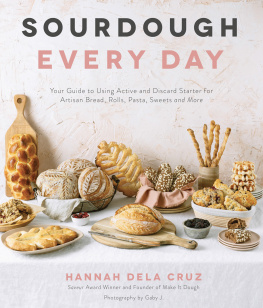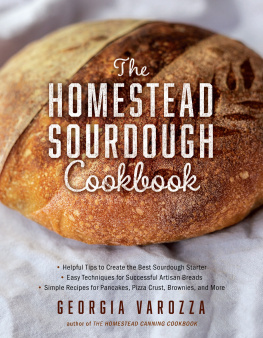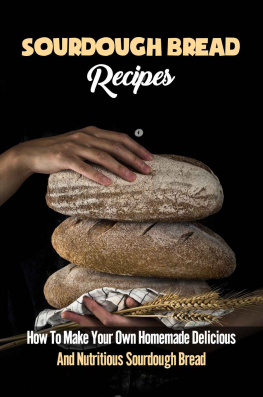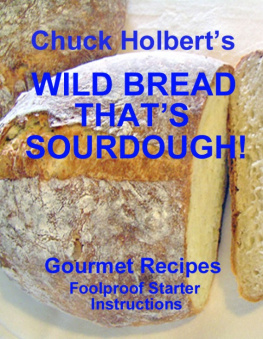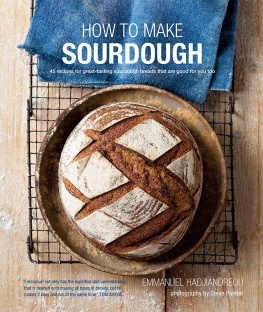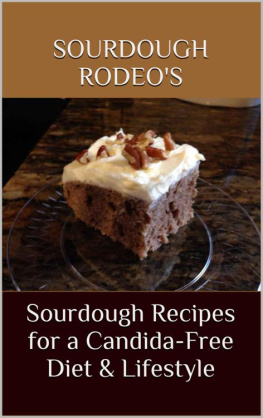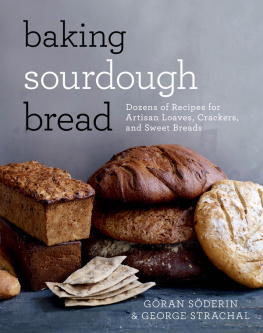Contents
Guide
SOURDOUGH
EVERY DAY
Your Guide to Using Active and Discard Starter for Artisan Bread, Rolls, Pasta, Sweets and More
HANNAH DELA CRUZ
Saveur Award Winner and Founder of Make It Dough
Photography by Gaby J.
The author and publisher have provided this e-book to you for your personal use only. You may not make this e-book publicly available in any way. Copyright infringement is against the law. If you believe the copy of this e-book you are reading infringes on the authors copyright, please notify the publisher at: http://us.macmillanusa.com/piracy.

Copyright 2020 Hannah Dela Cruz
First published in 2020 by
Page Street Publishing Co.
27 Congress Street, Suite 105
Salem, MA 01970
www.pagestreetpublishing.com
All rights reserved. No part of this book may be reproduced or used, in any form or by any means, electronic or mechanical, without prior permission in writing from the publisher.
Distributed by Macmillan, sales in Canada by The Canadian Manda Group.
eISBN 978-1-64567-203-6
Our eBooks may be purchased in bulk for promotional, educational, or business use. Please contact the Macmillan Corporate and Premium Sales Department at 1-800-221-7945, extension. 5442, or by e-mail at .
Library of Congress Control Number: 2019957404
Cover by Rosie Stewart and book design by Meghan Baskis for Page Street Publishing Co. Photography by Gaby J.
TO JOEL
FOR GIVING ME THE FREEDOM TO FIND MY PASSION
I think you have to be obsessed with bread to be a baker.
Nancy Silverton
Im not a chef or a trained baker, but I am obsessed with bread. I fell fast and hard for sourdough. From the moment I created my first sourdough starter, I couldnt get enough. I loved the tactile nature of making bread; digging my hands into sticky dough and scoring loaves with beautiful patterns helped all my anxieties flow away. Soon I went from not eating bread for years to making several loaves a week to baking things I never thought would come out of my oven.
The moment I discovered sourdough, I found myself starving for information. I took in everything I could find. I read blogs, watched videos, collected cookbooks, consulted with strangers in Facebook groups and message boards, made friends on Instagram, even read research papers, just so I could understand exactly why my breads were not turning out the way I wanted them to. I needed to understand what was going on in my starter and how it was affecting my dough. I needed to know exactly why sourdough is good for you. And I needed to be able to answer people when they asked me, Whats the point of spending two days just to make one loaf of bread?
Sourdough for me represents eliminating the phrase I cant from my vocabulary. I never thought I would be able to make bread. Once I did, I was no longer intimidated by anything else. This may sound dramatic, but sourdough changed my life.
Sourdough is transformative. Creating bread from just three ingredientsflour, water and saltis nothing short of alchemy. The health benefits of sourdough are directly correlated with the length of time it takes to create a loaf. Natural yeasts present in sourdough act as an external stomach, predigesting the flour, which makes it easier for us to digest and allows our bodies to absorb nutrients that are normally locked away in wheat. In addition, the extended fermentation period allows the bread to develop deep, complex flavors that cannot be attained when youre using commercial yeast.
In the hopes of making sense of all the information I was learning, as well as to document my progress by sharing the recipes I had created, I started the blog MakeItDough.com. A year later, I found myself on stage at the Saveur Magazine Blog Awards accepting the 2019 prize for Most Obsessive Blog. Today, more than 10,000 people have joined me on my journey through Instagram and thousands of people visit my blog each day. Ive received hundreds of messages from home bakers like me who have successfully re-created my recipes.
This book is a product of my passion for sourdough. Ill teach you everything I know about successfully creating an active sourdough culture in a way that is not too obsessive or cumbersome.
The first 20 recipes Ive created for you (from .
The recipes in this book are not for a large crowd, because I usually bake for just myself and my boyfriend. If youre baking for a large group, though, these recipes can easily be doubled.
Before we embark on this journey together, Id like to thank you for picking this book from among so many others to guide you on your very own adventure.

Bread is the greatest alchemy of all. Michael Pollan
Im so glad youve decided to begin your sourdough journey with me. In this chapter, Ill explain everything you need to get started to create your very first loaf of bread, including how to make your own sourdough starter. Ill introduce you to some breadmaking techniques and the terminology youll come across throughout this book. And most importantly, Ill share the tips Ive learned throughout my own adventure with sourdough.
Perhaps the most important tip for beginners is to purchase and use a kitchen scale to weigh your ingredients, measuring them in grams instead of cups. Grams are far more accurate and less subjective than cups and will help you achieve the most consistent results in your baking.
Ive provided the ingredient measurements first in grams throughout all my recipes to encourage you to use grams while baking your way through this book.
Sourdough starter is a miracle in a jar. Its a thriving ecosystem of yeast and bacteria living in perfect harmonyone that, if cared for, can even outlive you. There is a fair amount of complicated science involved in a sourdough starter, and its nice to understand all the interactions within it, but you dont need a PhD to make great bread. The only thing you need to keep in mind is that to create beautiful bread, youll need a mature, active starter that can produce enough carbon dioxide (bubbles) to make bread rise. You will never produce a good loaf of bread using a weak starter.
For all its complexity, creating a sourdough starter could not be simpler. All you need is flour, water, ajar, time and, perhaps the most important ingredient of all, patience. Nurturing a strong starter takes timeabout two weeks. Using your starter before it has matured is an exercise in futility that will result in a dense loaf, frustration and wasted time and ingredients.

